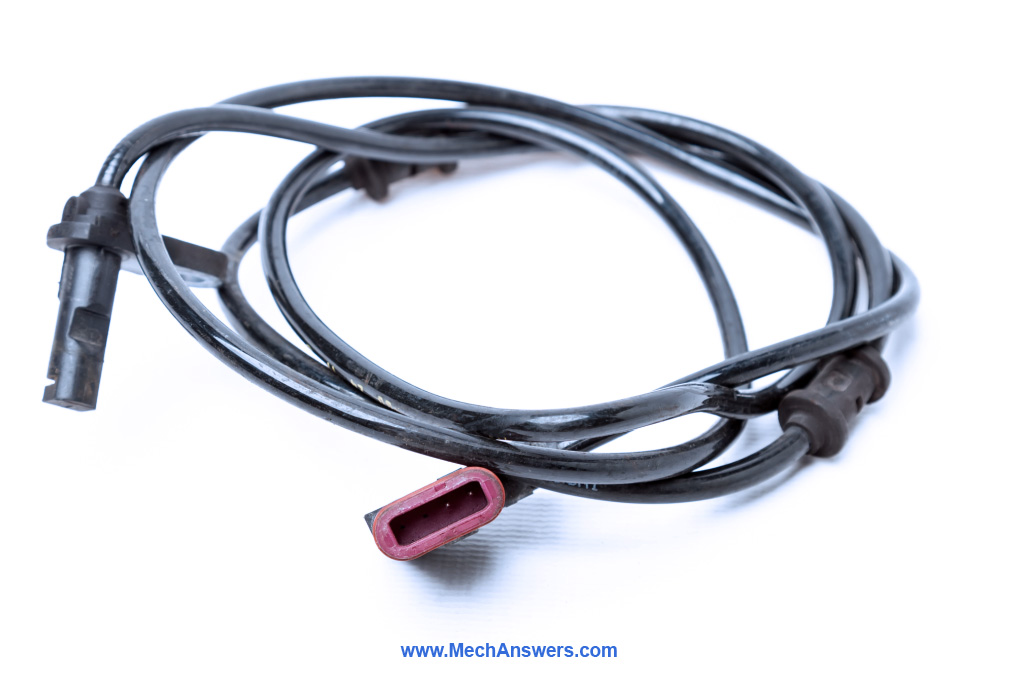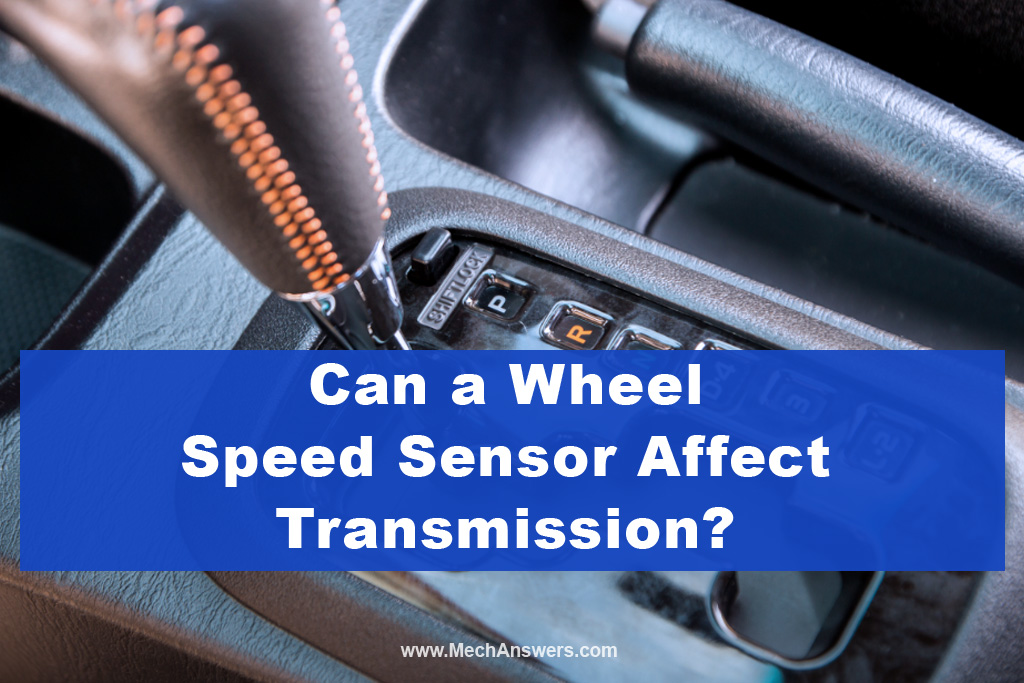You may have asked yourself, even sought out answers online, for “Can a Wheel Speed Sensor Affect Transmission?”, haven’t you? Well, look no further. This article will guide you through the intricacies of this mechanical issue.
So, when you ask “Can a Wheel Speed Sensor Affect Transmission?”, the answer is yes. The wheel speed sensor plays an integral role in the operation of various systems in your car, including the transmission. If this sensor malfunctions, it can lead to transmission problems, which can affect the overall performance of your vehicle.
Reading this article is essential for anyone wanting to understand the interconnectedness of their car’s components. It not only explains the role of the wheel speed sensor but also highlights its influence on the transmission and your car’s overall performance.
Table of Contents
What Is A Wheel Speed Sensor?
Before explaining their effect on your vehicle’s transmission, let’s take a deep dive into the wheel speed sensor, also known as the anti-lock braking system (ABS), and the role it plays in your vehicle.
Each of your wheels has an ABS sensor, a small metallic device attached to the inner wheel hub. The ABS sensors report the exact speed of each wheel to the engine control unit (ECU) which in turn keeps the engine working smoothly.
The system involves a toothed ring and magnet, which generates an electric field that is turned into a signal and travels to the ABS controller.
The speed of each wheel or axel is regulated by the ECU. If it detects a wheel locking up, the ABS system is initiated. For example, if one wheel skids on a piece of gravel, that speed is measured at zero compared to the other wheels.
If this happens, the ABS motor turns on to prevent the braking tire from locking up.

What Happens If The Wheel Speed Sensor Goes Bad?
There are plenty of signs you can be on the lookout for when your ABS goes bad, and some of them can really lead to dangerous situations. Here are some of the things you should be on the lookout for:
Transmission shifting improperly
As mentioned before, if your vehicle is consistently changing gears at strange times, like you feel your engine is revving too much or you’re struggling with getting the right amount of acceleration, this can be a sign your ABS is bad.
Brakes take longer to stop your vehicle
The ABS should automatically slow down your vehicle when you slam the brakes. However, if your ABS is faulty, your vehicle can lose traction. If you drive your car every day, you should naturally know how long it takes you to stop. If your braking time increase, you should check your ABS sensors.
Vibrating brake pedal
If your ABS sensors are producing the wrong speeds for one or more of your wheels, your vehicle can think it’s on a slick surface when you are driving in dry conditions, or vice versa. The traction control may activate because of this, which will cause your brake pedal to pulse or pump while you are braking.
Wheels skidding while braking
Under wet or driving conditions, your vehicle’s ABS will help control your braking system, helping the wheels stay unlocked and stop you from hydroplaning. If you’re noticing your vehicle is skidding more often, this can be an issue with your wheel speed sensor.
Warning lights
There are several warning lights that will illuminate your dashboard if your ABS stops sending signals to your vehicle’s computer. There is the ABS warning light, ESP warning light, and even the check engine light illuminates if your vehicle’s make doesn’t have the previous two lights.
The cruise control system malfunctions or fails
Your ABS plays a big part in controlling your cruise control system when braking to maintain speeds. If your system senses a broken or inconsistent wheel speed sensor, it will not allow you to use your cruise control system at all.
How Does A Defective Wheel Speed Sensor Affect The Transmission?
Role of the Wheel Speed Sensor
The wheel speed sensor, also known as an ABS sensor, is a key player in your vehicle’s anti-lock brake system. Its primary role is to monitor the rate at which your car’s wheels are rotating and send this information to the car’s engine control unit (ECU). If it starts to malfunction, it can cause a chain reaction of problems within your car’s systems, including the transmission.
Impact on the Engine Control Unit
The ECU utilizes the data from the wheel speed sensor to manage a multitude of vehicle functions. If the sensor sends incorrect data, the ECU may interpret this as a problem and trigger the check engine light or a specific trouble code related to the transmission. This could lead to transmission issues that manifest as hard or erratic shifting, among other things.
Effects on the Traction Control System
Furthermore, a faulty wheel speed sensor can interfere with the car’s traction control system. As a result, the car might struggle with traction, leading to transmission-related issues.
For instance, the transmission could get confused about the appropriate gear to engage, affecting the car’s acceleration and overall performance.
Influence on Cruise Control
Your vehicle’s cruise control also relies on the wheel speed sensor. If the sensor is malfunctioning, it could result in a loss of cruise control, which indirectly affects the transmission’s functioning.
In the worst-case scenario, the vehicle might slip into “limp mode,” limiting the speed to protect the engine and transmission from further damage.
Disruption of the Electronic Stability Program
Additionally, modern cars have an electronic stability program (ESP), which uses the wheel speed sensor’s data. A faulty sensor can affect the ESP, causing problems like poor handling and erratic transmission performance.
For example, the transmission might not shift correctly during hard turns, which could lead to accidents in extreme situations.
The Importance of Regular Maintenance
In essence, the wheel speed sensor is linked to the transmission through several channels, primarily the ECU. If the sensor fails, it can indirectly affect the transmission and cause notable performance issues. So, if your car is exhibiting transmission problems, one potential culprit could be the wheel speed sensor.
The significance of the wheel speed sensor and its potential impact on the transmission underlines the importance of regular maintenance.
Getting your car checked regularly can help detect and rectify any issues with the wheel speed sensor before they cause more serious problems. When in doubt, it’s always best to consult with a professional mechanic.
Conclusion: Wheel Speed Sensor and Transmission
In summary, the wheel speed sensor plays a vital role in the proper functioning of your vehicle, including the transmission.
Its impact may not be directly noticeable, but the effects of a malfunctioning sensor can definitely be felt in the vehicle’s performance. Recognizing these signs and addressing them promptly can help maintain the health of your car’s transmission and ensure a smoother driving experience.
What Causes A Wheel Speed Sensor To Break?
The ABS is located on the hub or wheel bearing on the internal wheel, which makes it relatively exposed to dirt, debris, and other foreign buildups.
Water can also seep into the system, which will cause erosion in the sensor, too. Here are some of the issues that can cause damage to your wheel speed sensor:
- Corrosion weakening the sensor’s signal strength
- Road debris blocking the ABS sensor
- Metallic debris collecting to the sensor magnetic encoder ring
- Contaminated sensor
For some of these cases, you can simply use a soft bristle brush to wash the decoder ring and hub bearing. But in some cases, especially with older vehicles, your speed sensor can simply break due to normal wear and tear.
How Easy Is It To Fix The ABS Sensor?
There are four ABS sensors in most vehicles, one for each wheel. The first thing you should do is get the On-Board Diagnostic (OBD) error code from your computer’s vehicle by either bringing your vehicle to an auto mechanic or using an OBD2 scanner or code reader.
Once you find the code, it will tell you which of the ABS sensors is broken.
You can also use a multimeter to check if an ABS sensor is functioning or not. Because your wheel speed sensor is creating an electric current, you’ll be able to test the sensors with the multimeter.
First, you’ll have to remove the sensor and connect it to the multimeter. If you get a very high or low reading, then the sensor is bad.
Purchase a new ABS sensor online or at a parts store. These generally run around $30 to $50, but be sure to check which works for your vehicle’s make and model. From there, you’ll have a 15 to 30-minute job by following these steps:
- Lift your car on a jack or turn the wheel in the opposite direction of where the ABS sensor is so you can easily access the wheel hub.
- Locate the wheel speed sensors. You can check your owner’s manual if you’re having trouble finding it.
- Loosen the bolt holding the faulty sensor and remove it from the wheel hub.
- Disconnect the wiring.
- Attach the wiring to the new ABS sensor.
- Attach the new sensor by tightening the bolt.
Mechanics typically charge $150 to $200 for the labor of this type of job, but if you are struggling with any of the steps above, it is better to have the job professionally done.
Symptoms Of A Bad Speed Sensor – Hard Shifting – Transmission Issues >> Check out the video below:
Read more >> Transmission Fluid is Leaking From Front of the Car? (Facts)
Read more >> Metal Grinding Sound When Driving Or Turning? (Top Reasons)
Conclusion
Even if your wheel speed sensor isn’t affecting your transmission, driving with a faulty sensor is incredibly dangerous. If you see any of the signs of a faulty ABS system, fixing it quickly will not only save you money in the long run, but it can also save your life while driving under dangerous conditions!

